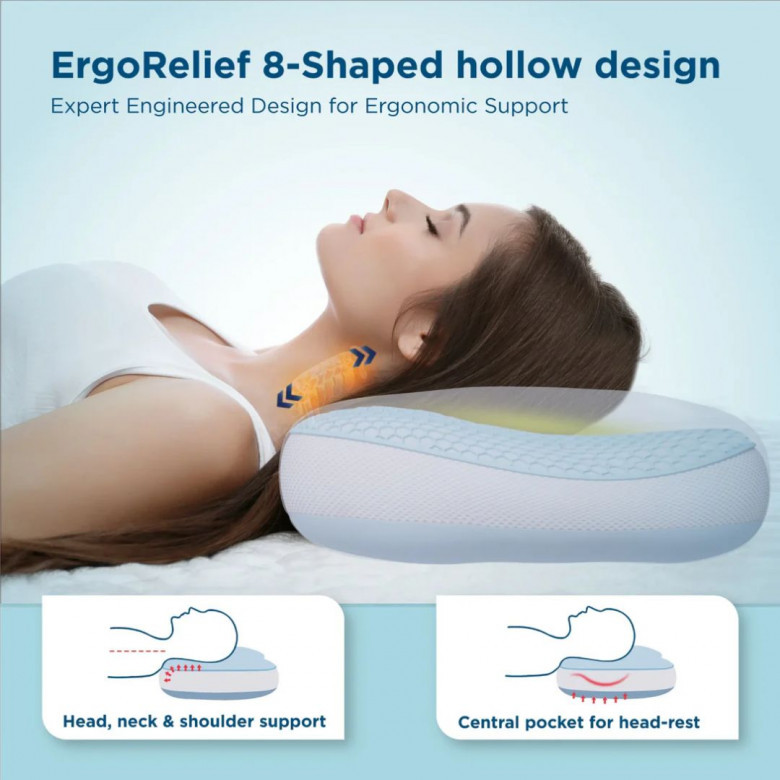views
Rising with a stiff neck or sore shoulders can wreck your day before it even begins. For a lot of folks, chronic shoulder and neck pain is caused by bad sleeping position, poor support, or an improper pillow. That's where orthopedic pillows enter the picture — built specifically to give the natural position of the spine proper support and pressure relief, these pillows can be the key to your sleep-related pain woes.
But do orthopedic pillows really relieve neck and shoulder pain? Let's see what the experts and research have to say.
What Is an Orthopedic Pillow?
An orthopedic pillow is specifically designed to cradle the head, neck, and shoulders while keeping the spine properly aligned during sleep. Orthopedic pillows are usually constructed from memory foam, latex, or contoured material that conforms to the shape of your head and neck.
Unlike ordinary pillows that can collapse or lose shape while one sleeps, orthopedic pillows are flexible yet firm, providing support in the same position every time to the areas that are most prone to tension and strain.
How Poor Sleep Posture Affects the Neck and Shoulders
Sleep posture plays a significant role in musculoskeletal health. When your neck is bent too far forward, tilted to one side, or unsupported during the night, it places excessive pressure on the cervical spine and surrounding muscles.
Over time, this can lead to:
Muscle stiffness
Joint inflammation
Nerve impingement
Reduced mobility
Chronic neck and shoulder pain
An unsupported pillow can make these issues worse. For example, a pillow that is too high can raise the head in an unnatural way, and one that is too soft can allow the neck to sink without support. Both situations cause discomfort and chronic pain.
How Orthopedic Pillows Help Alleviate Pain
Orthopedic pillows are specifically designed to encourage neutral spine alignment, keeping the head, neck, and shoulders in a natural, supported position. Here's how they assist:
1. Cervical Spine Support
Orthopedic pillows tend to be contoured to cradle the neck and support the cervical spine's natural curve. This reduces stress on neck muscles and joints, alleviating pain and stiffness.
2. Even Pressure Distribution
Materials such as memory foam or latex spread weight uniformly across the pillow surface, avoiding pressure concentration in one region. This discourages tension on shoulders and compression of nerves.

3. Resting Position Adaptability
No matter if you are a back, side, or stomach sleeper, orthopedic pillows are available in those suited to each sleeping position:
Back sleepers are helped by pillows that cradle the neck without lifting the head excessively.
Side sleepers require firmer pillows with height to fill the gap between shoulders and neck.
Stomach sleepers (while not preferable) may employ lower-profile orthopedic pillows to minimize stress.
4. Muscle Relaxation
By adequately supporting the muscles of the neck and shoulders, orthopedic pillows enable muscles to relax completely and recover at night, aiding in healing and inflammation reduction.
Scientific Support and Expert Opinions
Several studies and health experts advocate the use of orthopedic pillows for neck and shoulder pain.
A study published in the Journal of Physical Therapy Science found that cervical pillows significantly reduced neck pain and improved sleep quality compared to conventional pillows.
Chiropractors and orthopedic doctors often recommend contoured or cervical support pillows for patients with chronic musculoskeletal pain.
The American Chiropractic Association points out that the right pillow support can alleviate tension headaches, shoulder pain, and even upper back pain.
Orthopedic pillows are not a panacea, but they are frequently a valuable component of a comprehensive pain management plan that incorporates physical therapy, stretching, and lifestyle modifications.
Selecting the Right Orthopedic Pillow
Not all orthopedic pillows are the same. Here are a few things to look for when selecting the right one:
Material: Natural latex and memory foam are favorites due to their contouring and support abilities.
Firmness: It will not be able to support your neck if it is too soft. If it is too firm, it could put additional pressure. Most people prefer medium-firm.
Shape: Cervical pillows are best suited for cervical alignment. Some pillows have side cutouts for added shoulder support.
Sleeping Position: Select a pillow that has been specifically made for your major sleeping position.
Allergies: Choose hypoallergenic materials if you experience sensitivities.
Always give your body a brief adjustment time your body will probably take a few nights to adapt to the new alignment and firmness.
Who Can Benefit the Most?
Orthopedic pillows will benefit a broad spectrum of individuals, particularly those who suffer from:
Chronic neck and shoulder pain
Stiffness upon waking up after sleeping
Tension headaches
Cervical spondylosis or arthritis
Herniated discs in the neck
Poor posture habits
Stress-related muscle tension
Even if you don't currently experience pain, sleeping with an orthopedic pillow can be a preventive solution, providing improved sleep posture and long-term spinal well-being.
Conclusion
Orthopedic pillows do indeed address neck and shoulder pain sometimes quite dramatically. By providing proper alignment, taking pressure off, and facilitating muscle relaxation, these special pillows induce healthier, more restful sleep.
If you've already attempted everything from painkillers to massage therapy with minimal results, an orthopedic pillow could be the easy, non-surgical answer you've been lacking.
Invest in your sleep, and your body will thank you each morning.






















Comments
0 comment